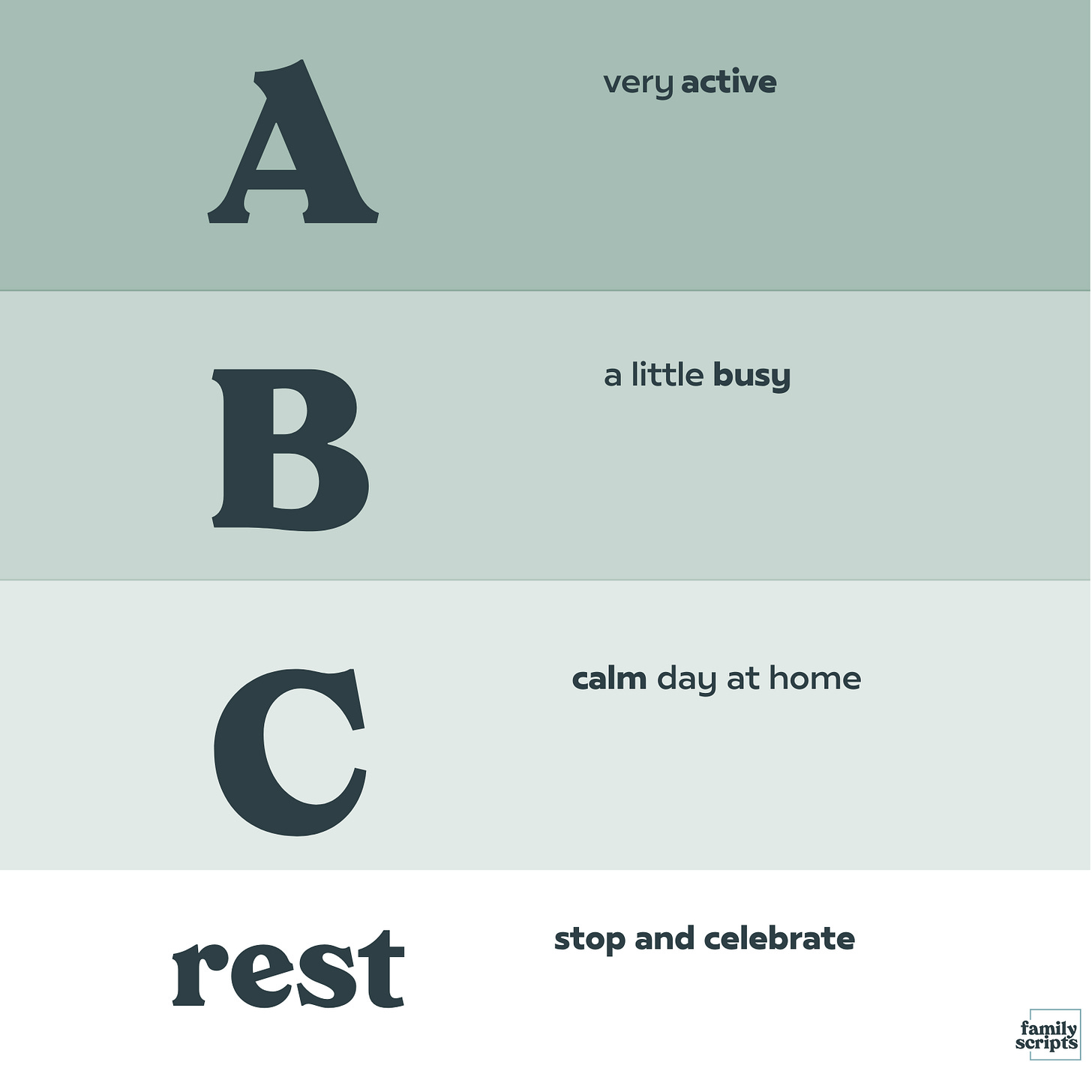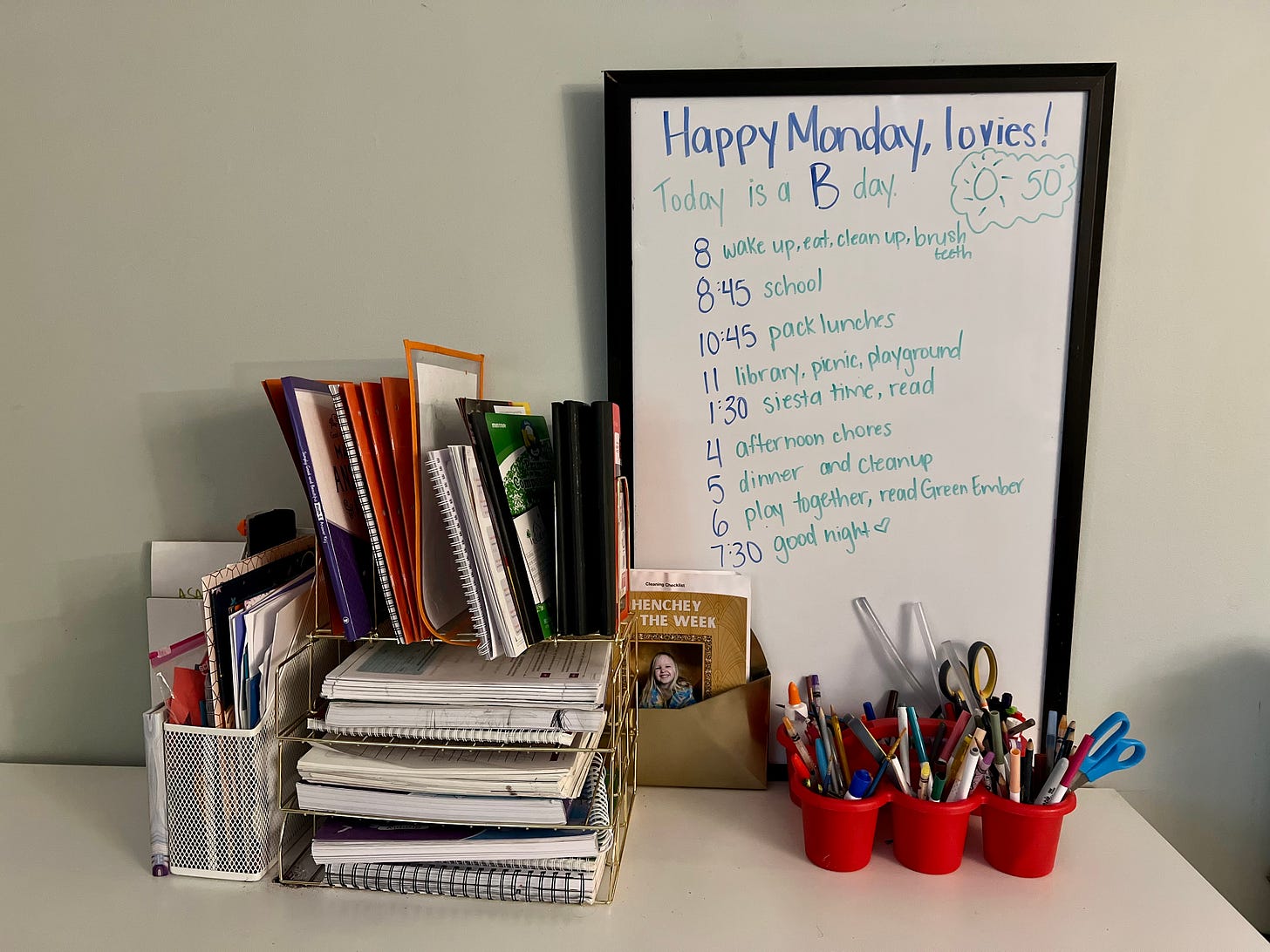Simplifying Schedules...For Everyone's Sake
sometimes your kids (and you) are just tired
Hello! As we dream of how we want to spend next year with purpose and productivity, I don’t want to just share hacks so you can “do more” but I want to encourage you to do what’s important to you…because you are an incredibly capable person, but not a robot with infinite capacity. Our kids have constraints, too.
We humans don’t like to admit that we have limits 😬 Sometimes we miss our own body’s cries for help because we don’t realize that we’re just trying to do too much and be too much. Sometimes we mistake our kids’ frustrating behavior for disobedience when, really, they just have a lot going on.
In his fantastic book Simplicity Parenting, Kim John Payne observed that many children living comfortable lives in America showed a lot of the same PTSD symptoms as kids in war-torn villages. The cause? Overstimulation.
Too much activity, too many toys, and too much awareness of all the bad things going on in the world proved destructive. Parents’ efforts to give their kids the best childhood possible were actually quite harmful. The solution? Intentional simplicity.
Rating Your Day’s Activity Ideas
One huge way to do this is by simplifying your schedule and becoming more aware of when your kids are feeling overstimulated. If you have a whole bunch of high-energy, A-level activity days in a row, you can expect your kid to be extra irritable!
When you build rest and routine into their days, you might be surprised by how much happier and more enjoyable they are to be around. (Obviously, this applies to us grownups, too.)
I challenge you to look at last week’s calendar. Think about each day of the week and rate the activity level as one of the following:
A - high level of stimulation, such as being out all day
B - medium level of stimulation, like being busy half the day
C - a calm day with plenty of moments to be still
Day of Rest1
What kind of balance did you have? If you had three “A” days in a row, I’ll bet your kid wasn’t too fun to be around on Day 4. But everyone’s family has different preferences! Some people are happily homebodies and some people (like me and most of my kids!) thrive with regular outings and adventures. It can be difficult to meet the scheduling preferences of everyone in your family, but it helps to be aware that we all have limits.
Here’s a chart I made for our family so we can have expectations of the kind of stimulation from that day. (If your kids go to school, I would consider that a “B” day…an “A” day if they have activities or errands after school.)
Hopefully through all of this, you can consider what healthy rhythms and routines could look like for your family. Think about what your kids will fondly remember about their childhood when they’re adults. Maybe you don’t have to drive your kids to dance and ukelele and soccer every week. Maybe they don’t need a busy schedule and they just want time to be.
Maybe each person in your family will grow best in the rich, fertile soil of simply being in your loving home.
Here’s a printable we made for you to help you think through the activity/stimulation level of your days. You can customize this to fit your own family’s needs.
Plugging in each day’s letter score in the calendar helps plan meals and consolidate (or eliminate!) errands. I always plan easier meals like leftovers or a quick frozen Trader Joe’s stir fry on “A” days and crock pot meals on “B” days. “C” days are best for more labor-intensive dishes or make-ahead meals.
And you know what else I’ve found? Kids get a lot of comfort from knowing what to expect when they wake up, especially if they’re used to a varied schedule. Here’s a board I try to update for them each day with our schedule and the weather.
I hope all this helps you. I would love to hear what you come up with.
Warmly,
Hope from Family Scripts
P.S. Here are some more quotes from Simplicity Parenting by Kim John Payne that I think you might like:
“In the tapestry of childhood, what stands out is not the splashy, blow-out trips to Disneyland but the common threads that run throughout and repeat: the family dinners, nature walks, reading together at bedtime, Saturday morning pancakes.”
“Rest nurtures creativity, which nurtures activity. Activity nurtures rest, which sustains creativity. Each draws from and contributes to the other.”
"Why do our kids need to be busy all of the time? Why does our son, age twelve, need to explore the possibility of space travel? Why do we feel we must offer everything? Why must it all happen now? Why does tomorrow always seem a bit late? Why would we rather squeeze more things into our schedules than see what happens over time? What happens when we stop, when we have free time?”
“After all, it's not just what you make of your time, it's whether you have the time to make it your own.”








These are so helpful! 🙌 I can’t thank you enough & I hope to begin using these this very month & throughout the year. Feel free to to tap me on the virtual shoulder & check in with my progress, haha! I’d love the accountability. 💝